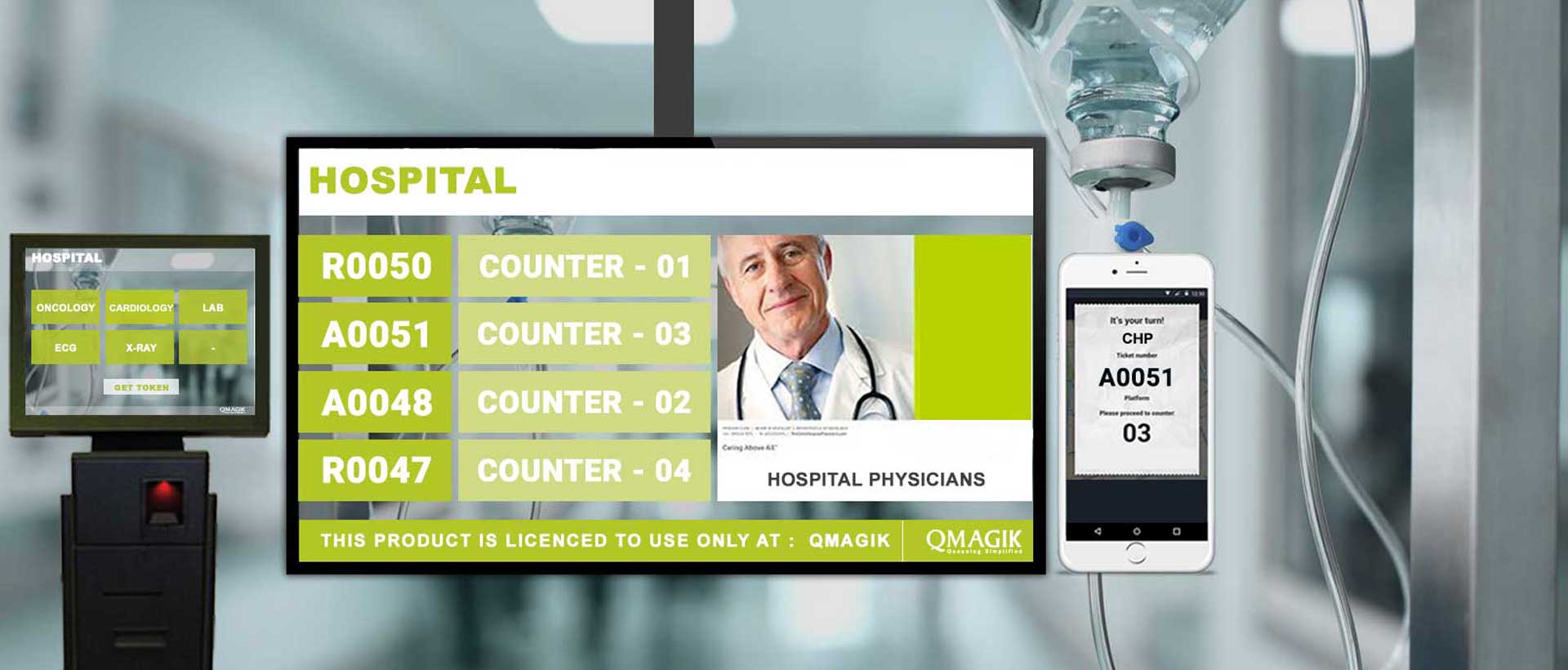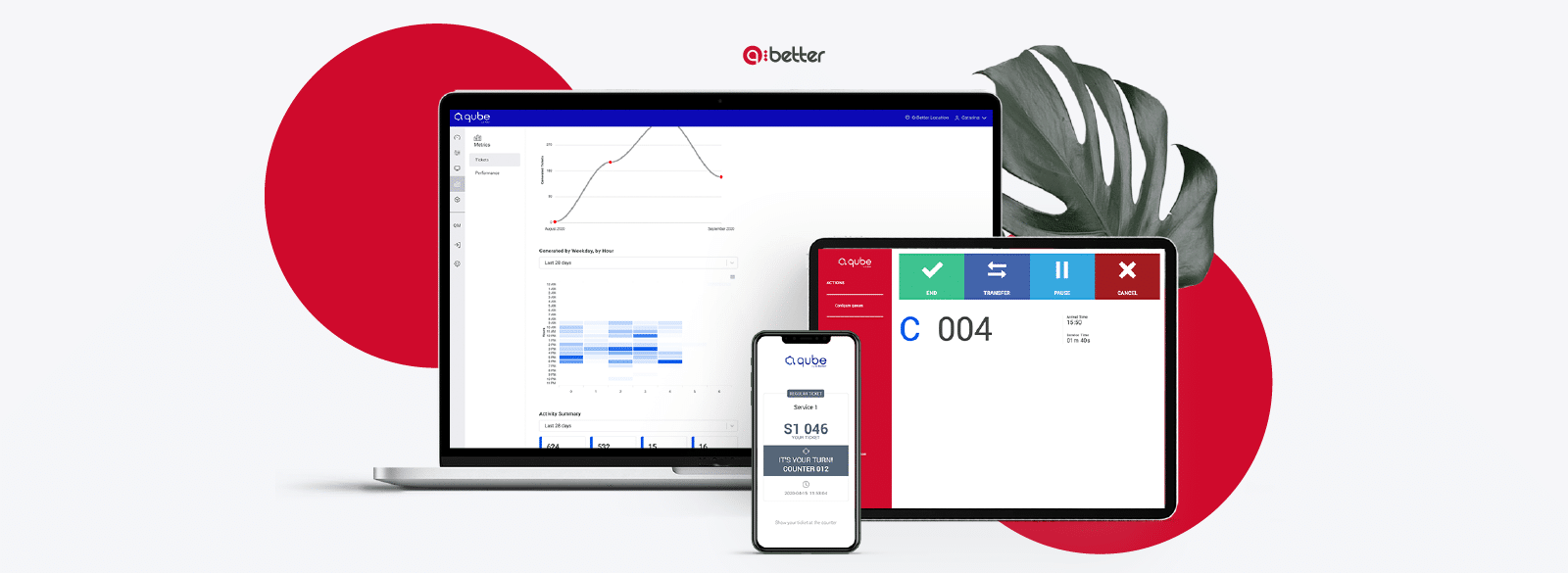- Home
- About Us
- Products
- Electronic Article Surveillance System EAS / Retail Anti theft Systems
- Display Stands
- Restaurant Pager
- People Counting Systems
- Queue Management Systems
- Access Control System
- Time Attendance Systems
- Audio & Visual System Solutions
- Display Solutions
- CCTV Cameras in Qatar: Enhancing Security Solutions
- Time Lapse Construction Camera
- Flap Barrier, Speed Gates, Turnstiles Access Control
- Gate Barriers System & Bollards in Qatar
- Parking Management & Gate Automation
- Library Management Systems
- IT & Telecom
- Lockers & Key Management Systems
- Intrusion Alarm System
- Perimeter Security
- Vehicle Tracking
- Time Recorders & Time Stamps
- Emergency Exit Door Alarms
- Clients
- Contact Us
- Support
Contents
- 1 Clinic Queue Management System: Optimizing Patient Experience
Clinic Queue Management System: Optimizing Patient Experience
Introduction
In the realm of healthcare, where time is of the essence and patient well-being is the top priority, the introduction of Clinic Queue Management System (CQMS) has been a transformative development. These systems are not merely a technological upgrade; they represent a paradigm shift in how patient care is administered and managed.
Efficiency in Healthcare: A Vital Metric Efficiency in healthcare is multifaceted, encompassing the swift and accurate delivery of medical services, optimal use of resources, and minimization of patient wait times. In this context, Clinic Queue Management System serves as a critical tool, enabling clinics to navigate the complexities of patient care with agility and precision. By automating the queuing process, these systems ensure that patients are attended to promptly, which is not only a marker of good service but also a determinant of health outcomes.
Patient Satisfaction: The Heart of Healthcare Quality Patient satisfaction is increasingly recognized as a key indicator of healthcare quality. It reflects the success of a clinic in meeting and exceeding patient expectations, which includes the provision of timely medical attention. Clinic Queue Management System directly contributes to this aspect by reducing the uncertainty and discomfort associated with long wait times, thereby fostering a more positive patient experience.
The Role of Clinic Queue Management System in Modern Healthcare Clinic Queue Management System integrates seamlessly into the daily operations of clinics, offering a robust framework for managing patient flow. This system provides real-time updates and wait time forecasts, allowing patients to plan their visit more effectively. Moreover, it equips healthcare providers with valuable data analytics, enabling them to identify bottlenecks and optimize their service delivery.
A Step Towards Patient-Centric Care The adoption of Clinic Queue Management System is a testament to a clinic’s commitment to patient-centric care. By prioritizing the patient’s time and comfort, clinics can build trust and loyalty, which are essential components of a successful healthcare practice. In essence, Clinic Queue Management System is not just about managing queues; it’s about enhancing the overall quality of care and ensuring that every patient’s visit is as smooth and stress-free as possible.
In conclusion, the integration of Clinic Queue Management Systems into healthcare settings is a significant advancement that benefits all stakeholders. For patients, it means less time waiting and more time healing. For healthcare providers, it translates into streamlined operations and the ability to deliver superior care. As such, Clinic Queue Management System stands as a cornerstone of modern, efficient, and patient-focused healthcare.
What is a Clinic Queue Management System?
A Clinic Queue Management System (CQMS) is a sophisticated technology platform that revolutionizes the way healthcare facilities manage patient flow. At its core, CQMS is designed to optimize the patient journey from the moment they enter the clinic to the completion of their visit. Here’s an expanded view of what Clinic Queue Management System entails and how it elevates the patient experience:
Technological Integration Clinic Queue Management System integrates various technological components, such as digital kiosks, mobile applications, and online appointment systems, to create a cohesive and efficient patient management ecosystem. This integration allows for a more streamlined check-in process, reducing the need for manual paperwork and minimizing the potential for human error.
Real-Time Queue Monitoring With real-time queue monitoring, patients are kept informed about their wait times and appointment status. This transparency helps reduce anxiety associated with uncertainty and allows patients to manage their time more effectively while waiting.
Appointment Scheduling and Management Clinic Queue Management System offers sophisticated appointment scheduling capabilities, enabling patients to book, reschedule, or cancel appointments with ease. This flexibility helps to reduce no-shows and last-minute cancellations, ensuring that clinics can operate at optimal capacity.
Data-Driven Insights By collecting and analyzing data on patient flow, Clinic Queue Management System provides valuable insights into peak times, average wait times, and staff performance. These insights enable clinics to make informed decisions about resource allocation and operational improvements.
Enhanced Communication Effective communication is facilitated through automated notifications and alerts, keeping patients updated on their queue status and reducing the likelihood of missed appointments. This level of communication fosters a sense of respect for patients’ time and contributes to a more positive clinic experience.
Patient-Centered Approach At its heart, Clinic Queue Management System is about putting the patient first. By reducing wait times and streamlining administrative processes, patients spend less time in the waiting room and more time receiving the care they need. This patient-centered approach is crucial for building trust and satisfaction.
Impact on Patient Experience The implementation of a CQMS can lead to a significant enhancement in patient experience. Patients appreciate the reduced wait times, increased transparency, and the convenience that CQMS provides. This modern approach to queue management not only improves patient satisfaction but also positions the clinic as a forward-thinking healthcare provider.
In summary, a Clinic Queue Management System is much more than a tool for managing queues; it’s a comprehensive solution that addresses the multifaceted needs of modern healthcare facilities and patients alike. By leveraging technology to improve efficiency and patient care, Clinic Queue Management System plays a pivotal role in the evolution of healthcare service delivery.
Benefits of Clinic Queue Management System
The Clinic Queue Management System (CQMS) is a transformative tool that brings a multitude of benefits to healthcare facilities. Here’s an expanded look at the key advantages:
Reduced Wait Times One of the most immediate benefits of implementing a Clinic Queue Management System is the significant reduction in patient wait times. By managing patient flow more efficiently, CQMS ensures that patients are seen by healthcare providers without unnecessary delays. This efficiency not only improves patient satisfaction but also contributes to better health outcomes, as timely care is often critical.
Enhanced Staff Productivity CQMS automates many of the tasks that were traditionally done manually, such as patient check-in and queue management. This automation allows staff to redirect their focus towards more critical tasks that require human intervention, such as patient care and support. As a result, clinics can operate more smoothly and effectively, with staff productivity seeing a substantial boost.
Improved Patient Experience The patient experience is greatly enhanced through the use of Clinic Queue Management System. Real-time updates and clear communication keep patients informed about their wait times and appointment status, significantly reducing the anxiety and frustration associated with uncertainty. This transparency builds trust between the patient and the healthcare provider, fostering a more positive relationship.
Optimized Resource Allocation Clinic Queue Management System provides clinics with valuable data on patient flow and staff utilization, enabling informed decisions about resource allocation. This data-driven approach ensures that staff are scheduled according to demand, and clinic resources are used to their fullest potential. By optimizing resource allocation, clinics can reduce operational costs while maintaining high standards of patient care.
Increased Operational Efficiency The overall operational efficiency of healthcare facilities is greatly enhanced with the introduction of Clinic Queue Management System. Faster check-ins, streamlined patient flow, and reduced bottlenecks mean that clinics can serve more patients without compromising on the quality of care. This efficiency not only benefits the patients but also positions the clinic as a modern and efficient healthcare provider.
Better Patient Safety With Clinic Queue Management System, the risk of errors in patient management is reduced. Accurate tracking of patient appointments and history minimizes the chances of mix-ups, ensuring that patients receive the correct care at the right time. This accuracy is crucial for patient safety and contributes to the overall reliability of the healthcare facility.
Enhanced Patient Feedback The use of Clinic Queue Management System facilitates easier collection of patient feedback. With automated surveys and feedback mechanisms, clinics can gather insights into patient satisfaction and areas for improvement. This feedback is invaluable for continuous quality improvement and helps clinics to adapt and evolve according to patient needs.
In essence, the Clinic Queue Management System is not just a tool for managing queues; it’s a comprehensive solution that enhances every aspect of clinic operations, from patient satisfaction to staff productivity and operational efficiency. Its implementation is a step forward in the pursuit of excellence in healthcare delivery.
Axle Systems: Authorized Distributor for Clinic Queue Management System in Qatar
Axle Systems stands as a beacon of innovation and excellence in the realm of security and system integration. With a steadfast commitment to empowering businesses and safeguarding individuals, Axle Systems has carved a niche for itself as a leading provider of cutting-edge solutions in Qatar. The company’s recent authorization as the distributor of Clinic Queue Management System (CQMS) marks a significant milestone in its journey to revolutionize the healthcare sector with advanced technological solutions.
A Commitment to Excellence Axle Systems’ partnership with industry leaders in queue management technology ensures that healthcare facilities in Qatar have access to the most sophisticated systems available. These systems are designed to enhance patient flow management through features like virtual queues, SMS notifications, centralized management, and app integrations, all aimed at improving the patient experience and clinic efficiency.
Tailored Solutions for Healthcare Understanding the unique challenges faced by healthcare providers, Axle Systems offers tailored CQMS solutions that address the specific needs of clinics and hospitals. Whether it’s a small clinic or a large hospital, Axle Systems provides scalable and customizable queue management solutions that integrate seamlessly with existing healthcare systems, ensuring a smooth transition to more efficient patient service.
Expertise and Innovation As an ISO 9001-2008 certified company, Axle Systems is recognized for its expertise and innovation in the security and system integration industry. The company’s dedication to quality assurance and client-focused approach has earned it a reputation for reliability and excellence. By choosing Axle Systems for CQMS, healthcare facilities in Qatar are not just investing in a product but in a partnership that guarantees ongoing support and a commitment to success.
Enhancing Healthcare with Technology The introduction of CQMS by Axle Systems in Qatar’s healthcare landscape is set to transform the way clinics and hospitals manage their patient flow. The benefits of reduced wait times, improved communication, and enhanced patient satisfaction are just the beginning. With Axle Systems at the helm, healthcare providers can look forward to a future where technology and care converge to create the best possible experience for patients and staff alike.
In summary, Axle Systems’ role as the authorized distributor for CQMS in Qatar is a testament to the company’s vision of integrating technology into every aspect of business operations. With a focus on security, efficiency, and innovation, Axle Systems is poised to make a lasting impact on the healthcare industry, ensuring that patients receive the care they deserve in a timely and efficient manner.
About Axle Systems Qatar
Axle Systems, headquartered in the vibrant city of Doha, Qatar, has established itself as a trailblazer in the field of innovative security solutions. With a focus on cutting-edge technology and customer-centric services, Axle Systems has expanded its offerings to include advanced Clinic Queue Management Systems (CQMS), specifically designed to meet the intricate demands of healthcare providers in Qatar.
Innovation at the Core At the heart of Axle Systems is a commitment to innovation. The company’s portfolio of security solutions is a testament to its dedication to staying ahead of the curve. By incorporating the latest advancements in technology, Axle Systems ensures that its clients are equipped with state-of-the-art tools to enhance their operational efficiency and security.
Tailored Healthcare Solutions Recognizing the unique challenges faced by the healthcare industry, Axle Systems has ventured into the realm of CQMS with the aim of transforming patient experiences. Their systems are not one-size-fits-all; instead, they are meticulously tailored to align with the specific workflows and requirements of healthcare facilities in Qatar. This bespoke approach ensures that every client receives a solution that is not just effective but also seamlessly integrates into their existing processes.
A Partner in Healthcare Excellence Axle Systems views itself as a partner in healthcare excellence. By providing CQMS solutions, the company plays a pivotal role in helping healthcare providers improve patient flow, reduce wait times, and ultimately, deliver superior patient care. Their solutions are designed to empower healthcare providers to focus on what they do best – caring for patients.
Local Expertise, Global Standards With a deep understanding of local market dynamics and an unwavering commitment to global quality standards, Axle Systems is uniquely positioned to serve the healthcare sector in Qatar. The company’s ISO 9001-2008 certification is a reflection of its adherence to international standards of quality and excellence.
Comprehensive Support and Service Axle Systems’ relationship with its clients goes beyond the initial installation of CQMS. The company offers comprehensive support and service, ensuring that any issues are promptly addressed and that the systems continue to function optimally. This level of after-sales support is crucial for healthcare providers who rely on the uninterrupted performance of their queue management systems.
Conclusion As healthcare providers in Qatar strive to enhance their service delivery, Axle Systems stands ready to support them with advanced CQMS solutions. With a focus on innovation, customization, and exceptional service, Axle Systems is not just a vendor but a valuable ally in the pursuit of healthcare excellence.
Common FAQs of Clinic Queue Management System
How does CQMS improve patient flow? CQMS enhances patient flow by automating the queuing process, providing real-time updates, and optimizing staff allocation. This results in shorter wait times and more efficient service provision. By using tools like digital signage and automated notifications, CQMS keeps patients informed about their queue status and estimated waiting times, reducing anxiety and improving communication.
Can CQMS integrate with existing hospital management systems? Yes, CQMS can integrate seamlessly with existing hospital management systems. This integration allows for smooth data flow between systems, ensuring that patient information and appointment details are easily accessible and managed efficiently. This capability ensures that the CQMS complements and enhances the existing infrastructure rather than requiring a complete overhaul.
What kind of data analytics does CQMS provide? CQMS provides valuable insights into patient flow, waiting times, and staff usage. With this data, healthcare facilities can make informed decisions to improve patient experiences and manage resources more effectively. Analytics can help identify bottlenecks, forecast patient volumes, and even aid in proactive resource planning. Additionally, integrating patient feedback mechanisms with analytics allows for continuous service improvement.
These features of CQMS contribute to a smoother and more efficient patient flow, ultimately leading to enhanced patient satisfaction and better resource management within healthcare facilities.
Case Studies
Streamlining Operations: How a Local Clinic Transformed Its Patient Experience with CQMS
A local clinic in South Africa, known as Sibasa Clinic, implemented a Clinic Queue Management System (CQMS) to enhance patient experiences. The clinic, which is nurse-led and located in the Vhembe District, Limpopo, aimed to strengthen patient-centered care by measuring patient-reported experiences and their associations with sociodemographic characteristics.
The Challenge Before the implementation of CQMS, Sibasa Clinic faced challenges with long wait times, patient dissatisfaction, and inefficient use of staff resources. The clinic needed a solution that could address these issues without compromising the quality of care.
The Solution The clinic introduced a CQMS that provided real-time updates on wait times, streamlined the check-in process, and allowed for better staff allocation. The system also included features for patient feedback, which were crucial for continuous improvement.
The Outcome The introduction of CQMS led to a significant improvement in patient-reported experiences. Patients noted that nurses spent adequate time with them during consultations, and there was a notable increase in positive experiences regarding consultation time, understanding explanations, and shared decision-making. The clinic was able to improve its patient flow, reduce wait times, and enhance overall patient satisfaction.
Data-Driven Decisions: The Role of Analytics in Optimizing Healthcare Services
Healthcare analytics plays a crucial role in improving the performance of hospitals and healthcare services. A focused review of literature identified various advantages and potential gains of utilizing health analytics, as well as challenges and methods of overcoming these challenges.
The Challenge Hospitals and healthcare services often struggle with operational inefficiencies, patient safety issues, and the need for evidence-based decision-making. There was a need for a system that could provide insights into these areas and recommend solutions.
The Solution By implementing health analytics, hospitals can improve aspects such as patient safety, healthcare effectiveness, efficiency, and timeliness. Health analytics helps in identifying hidden values within big data, allowing researchers to analyze data to explore effective treatments, identify patterns related to drug side effects, hospital readmissions, or emergency department waiting times.
The Outcome The use of health analytics has led to improvements in the quality of decision-making and innovation in care and administrative activities. Hospitals have been able to adequately combine analytics capabilities and value creation mechanisms to enable knowledge generation and drive its assimilation, leading to better patient outcomes and operational excellence.
Conclusion
The advent of Clinic Queue Management Systems (CQMS) in Qatar, spearheaded by Axle Systems, marks a pivotal moment for healthcare providers in the region. This technology is not just an incremental improvement but a fundamental shift in how patient care is administered and managed.
A Leap Forward in Healthcare Delivery The implementation of CQMS by Axle Systems signifies a leap forward in healthcare delivery. By automating and optimizing patient flow, these systems promise to alleviate one of the most pressing issues in healthcare today: the long and unpredictable wait times that patients endure. With CQMS, clinics are equipped to offer a more predictable and efficient service, which is crucial for patient satisfaction and retention.
Enhancing Patient Satisfaction Patient satisfaction is closely tied to the quality of the healthcare experience, which includes the time patients spend waiting for services. CQMS directly addresses this by ensuring that patients are seen in a timely manner, thus enhancing their overall experience. Satisfied patients are more likely to return and recommend the clinic to others, driving growth and success for the healthcare provider.
Operational Efficiency: The Backbone of Effective Healthcare Operational efficiency is the backbone of effective healthcare, and CQMS is a key component in achieving it. By streamlining the queuing process, CQMS allows healthcare providers to serve more patients without sacrificing the quality of care. This efficiency not only benefits the patients but also the healthcare providers by improving throughput and reducing operational costs.
Data-Driven Decision Making One of the most significant impacts of CQMS is the wealth of data it provides. This data enables healthcare providers to make informed decisions about staffing, resource allocation, and service improvements. With actionable insights derived from real-time data, clinics can continuously refine their operations to better serve their patients.
Setting a New Standard in Healthcare Axle Systems’ role in bringing CQMS to Qatar sets a new standard in healthcare. Clinics that adopt this technology demonstrate a commitment to innovation and patient-centered care. As more healthcare providers follow suit, we can expect to see a transformation in the healthcare landscape, with improved patient outcomes and more efficient clinic operations.
Conclusion In conclusion, the implementation of CQMS by Axle Systems is a game-changer for healthcare providers in Qatar. It represents a significant step towards a future where healthcare is more accessible, efficient, and patient-focused. As clinics embrace this technology, they will not only see improvements in patient satisfaction and operational efficiency but will also be at the forefront of the healthcare revolution





